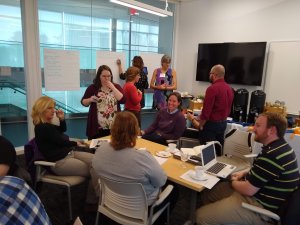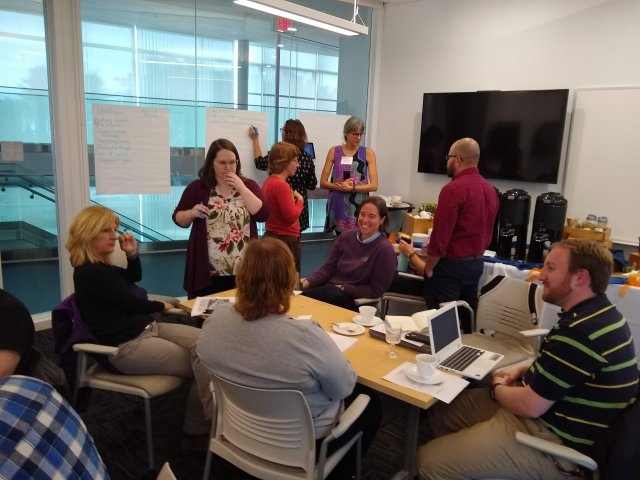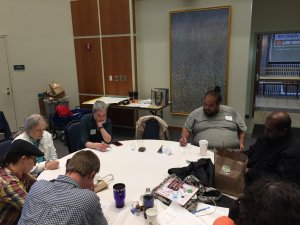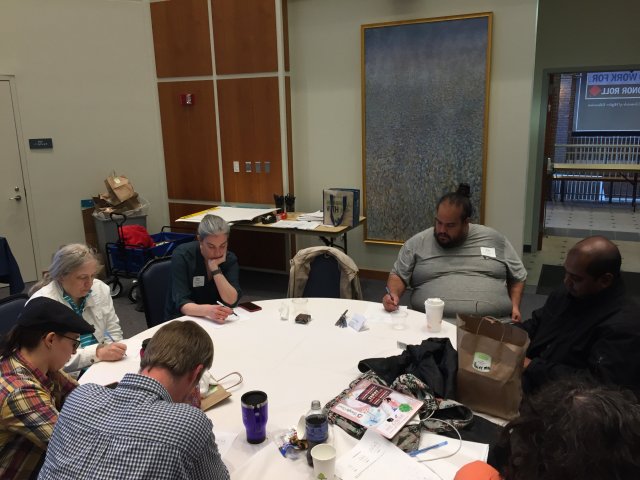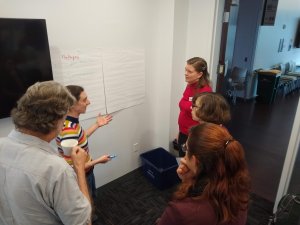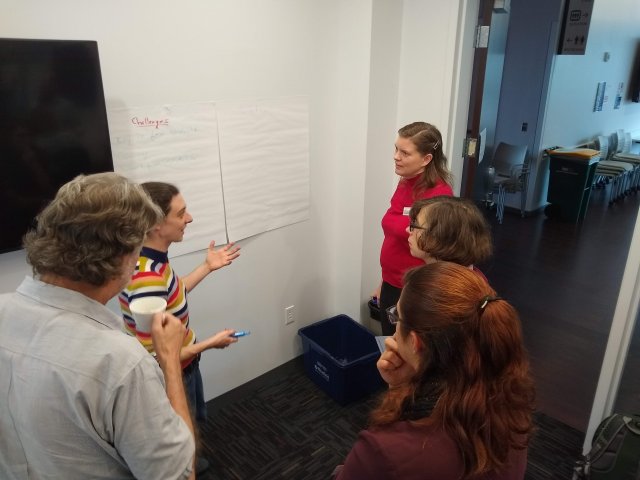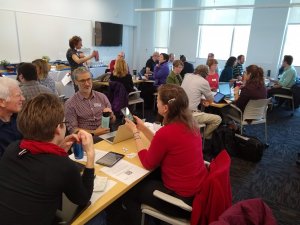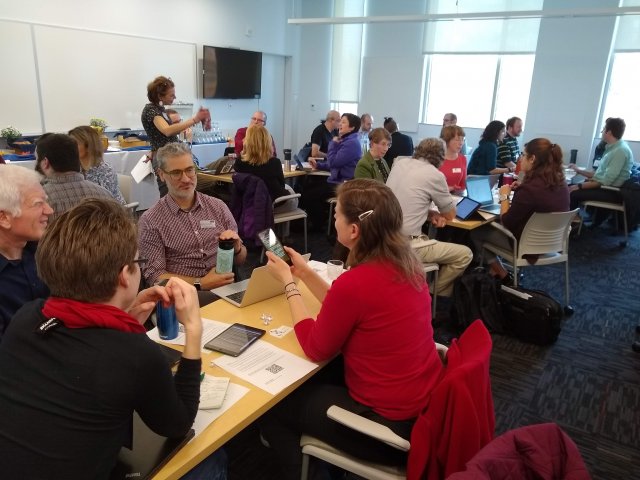Supporting an IBL Community & The Story of New England
Are you interested in offering events for your regional IBL community?
The purpose of this blog is to engage you in thinking about some aspects of planning events for your IBL community, as well as providing you with the activities the New England region (NE-IBLM) has offered over the last 2 years.
We also recommend reading the paper "A Model for Expanding Active Learning Regionally: The Greater Upstate New York Inquiry-Based Learning Consortium" by Cushman and al., which describes how the Greater Upstate New York Consortium started and has run events since 2010.
This blog is written with some active components, because we believe that any kind of learning happens best when we are first thinking about the topic at hand ourselves. So we invite you to pause for a bit at each task and think/ write/ talk...
You can also read a full annotated list of all the kinds of events run by NE-IBLM so far. While this blog is written by Volker Ecke and Christine von Renesse, the activities and ideas below are generated by the whole NE-IBLM leadership team which includes Nermin Bayazit (Fitchburg State University), Ileana Vasu (Holyoke Community College), and Rachel Schwell (Central Connecticut State University).
Goals
Task 1: What is your goal for your community event? Why do you want to run an event?
Here are some of the goals for the New England Consortium for Inquiry-based Learning in Mathematics (NE-IBLM):
- Start the community (bring experienced IBLers together as a core group)
- Spread the word of IBL: bring faculty together that are teaching more traditionally to show them what else is possible.
- Build community between members of the community. This includes creating a space in which vulnerable interactions are invited to take place.
- Invite a diverse group of faculty (institution type, student identities, faculty identities) to co-create the community.
- Practice particular tools available to faculty teaching with inquiry (facilitating discussions, writing IBL tasks, assessment techniques, …)
- Deepen our reflection on our own teaching and continue to grow as educators through collaboration.
- Learn new ideas together (that are new to all) that impact good teaching and/or our own knowledge of mathematics.
- Learn about the student perspective and about facilitation tools and struggles (Experience IBL together by doing mathematics -- Immersion in Inquiry)
- Learn how to think about students’ thinking (e.g. by looking at student work).
- Spread ideas about how to teach particular classes so we don’t have to reinvent the wheel.
Let us illustrate this list of goals with two specific events we have run.
Doing Math Together: We had a participant who wanted to (re-)learn topology. The primary goal was just that, but then a second goal emerged: we could learn about the student perspective of collaborating on mathematics online. The interested participants met once a week over the summer to present proofs, ask questions, discuss examples, and talk about their experience and implications for teaching. An interesting struggle occurred early on. Some of the interested participants had taken the class before and wanted to explore the topic again and in the light of inquiry. Others had never taken graduate level math classes before! This diversity turned out to be problematic: there was no “speed” that served the needs of everyone. This leads us to realize that it is important to think carefully about your audience when you consider events.
A similar example was our fall 2019 conference. We had planned the joint conference activities with a focus on participants new to IBL and had forgotten to carefully think about the needs of the more experienced faculty. We had not even asked them about their needs!
Audiences
Task 2: Who is your specific audience? What are they looking for? (Did you ask them?)
Again, we will show a few examples from NE-IBLM. In our inaugural conference we invited all experienced IBLers that we were aware of in our region to help us brainstorm next steps. We had a clear goal: start the community, and a clear audience to help us achieve the goal.
On the other hand, in Summer 2020, we believed that faculty wanted more support as the covid 19 pandemic had forced many of us to reinvent our teaching. We surveyed faculty in the beginning of summer, asking about which kinds of meetings they would prefer and which topics they would be interested in. Most community members opted for shorter, more frequent lunch meetings and gave us clear ideas for topics to discuss: assessment, engagement, equity and diversity, and different strategies for teaching IBL online. In this case we did not choose the (sub-)audience but we asked the community for their needs and based our planning on their feedback.
But sometimes you have an audience in mind and there are several events you could choose. Let’s say you would like your community members to deepen their reflection and insights about their own teaching because you would like them to take the next steps, and become even better teachers, and thus role models for other faculty. We decided on a faculty fellowship and coaching program, because we were able to find financial support for this more intense work. On the other hand, mutual class visits without more structure can already work toward this goal, as can modeling teaching, reflecting, and receiving feedback during workshops. So the resources often decide what is possible.
Activities and Events
Task 3: What possible activities or events can you run to further the goal you have for your specific audience?
And of course, what are the resources your community has available, in terms of facilitators, physical venues, geographic circumstances, financial support, or other dimensions, to run an activity or an event?
One place to start is likely your own repertoire of experiences with professional learning opportunities, such as conferences or workshops.
Here are some of the events that we have run as part of NE-IBLM, ranging from small-scale events that required very few resources to whole conferences. (You can read a more fully elaborated list, including goals, audiences, etc.)
- Lunch meetings around a particular topic: 1 facilitator, 20 participants, online, good questions discussed in small groups, some whole group sharing, 1-1.5 hours
- Classroom Visits & Reflection: two participants visit each other in their classes and reflect together about the experience (travel funding could help, proximity or Zoom, time, trust)
- Coaching: a faculty fellow works with closely with a mentor on a particular area of interest to the fellow; includes classroom visits, co-planning, co-teaching (stipend, travel funds, time, trust, geographic proximity or Zoom)
- Book group: 10 participants, one facilitator, meets once a month via Zoom, typically in the evening
- Doing Math Together: 10 participants, one facilitator, meets once a month via Zoom, typically in the evening
- Professional Learning Community (Linear Algebra, Differential Equations): 1 facilitators, 4-5 participants, built around shared classroom materials, online (email or Zoom); could include classroom visits & reflection in-person
- Day-long workshop for about 15-20 participants with focus on a particular topic (2 facilitators, lunch funded by participant registration, venue provided at no cost by host university -- or online via Zoom, 2 break-out groups with focus on different kinds of topics)
- Brainstorming conference with experienced IBLers to identify possible activities and events that would support a growing community: 50 participants, 4 facilitators, lunch funded by $15-20 registration, venue provided at no cost by host university, 3 break-out groups with focus on different kinds of events
- Conference for the entire IBL Community, from novices to experts: 50-100 participants, 4-6 facilitators, several smaller sessions with different focus, a few plenary activities, online on Zoom, or in person: venue provided at no cost by host university and lunch funded by $15-20 registration
And of course
- Regular Leadership Team Meetings: Five faculty in the leadership team meet about once a month on Zoom for 1-1.5 hours to plan activities and events, reflect, strategize, organize outreach, look for grant funding support (MLI, IBL-Communities), liaison with national IBL Communities Network (time)
You will note that certain activities or events that are familiar from other professional contexts, such as keynotes, panel discussions, webinars are absent from our list. That it is not an omission, it is in fact intentional.
Working with Faculty: Guiding Principles
Task 4: You know how to teach students in an inquiry-based classroom. What are your guiding principles for working with faculty in a professional development setting?
We believe that professional learning opportunities for faculty should be driven by active engagement in inquiry by participants in a collaborative structure where information and ideas flow in all directions: learning about teaching with inquiry should happen using methods of inquiry. Our interactive blog on “Using Inquiry for Transformative Change in Teaching” can help you explore these ideas further.
The following section traces the development of our ideas around guiding principles for NE-IBLM events.
Our NE-IBLM Vision
If learning about teaching with inquiry should take place using methods of inquiry, what could help guide us? When teaching mathematics with inquiry, the Four Pillars of Inquiry Based Mathematics Education can provide one framework for what it means to teach with inquiry (see the paper "I on the Prize: Inquiry Approaches in Undergraduate Mathematics" by Laursen and Rasmussen). The Four Pillars identify roles and actions of students and the instructor, respectively.
Four pillars for an IBL classroom:
- Students engage deeply with coherent and meaningful mathematical tasks
- Students collaboratively process mathematical ideas
- Instructors inquire into student thinking
- Instructors foster equity in their design and facilitation choices.
Now, let's think about inquiry in a faculty workshop, say. The workshop participants are now analogous to "students," the workshop facilitator stands in for the "instructor," and the content of the workshop is no longer "mathematics" but "teaching with inquiry."
Task 5: Use the above analogy to create a version of the "Four Pillars for IBL Professional Development." What do you notice about the resulting list?
Learning from Rochelle Gutiérrez, Brian Katz, and Jess Ellis-Hagman about a rehumanized version of the Four Pillars leads to even more inspiring pillars for our inquiry classroom. (We invite you to watch Rochelle Gutiérrez introduce “Rehumanizing Mathematics”; or read her 2018 paper “The need to rehumanize mathematics.”)
If we take these humanized Four Pillars and rewrite them for working with faculty we get the following pillars that form our vision of NE-IBLM:
Humanized version of the 4 pillars for faculty professional development:
- Participants should engage teaching with inquiry deeply and experience it as a living discipline. That teaching with inquiry should be driven by questions that make sense and are valuable from participants’ perspectives and should allow them to develop new insights and ideas. (transformative learning)
- Participants should collaborate, developing their own authority and collective ownership of the teaching with inquiry, engaging their full selves and bodies and learning about themselves and their peers through these interactions.
- Facilitators should leverage participants’ thinking to broaden teaching with inquiry and deepen the community discourse.
- Facilitators should attend to positioning each participant as a knower and person who is represented in teaching by inquiry and should actively resist historical and ongoing oppressive hierarchical systems.

